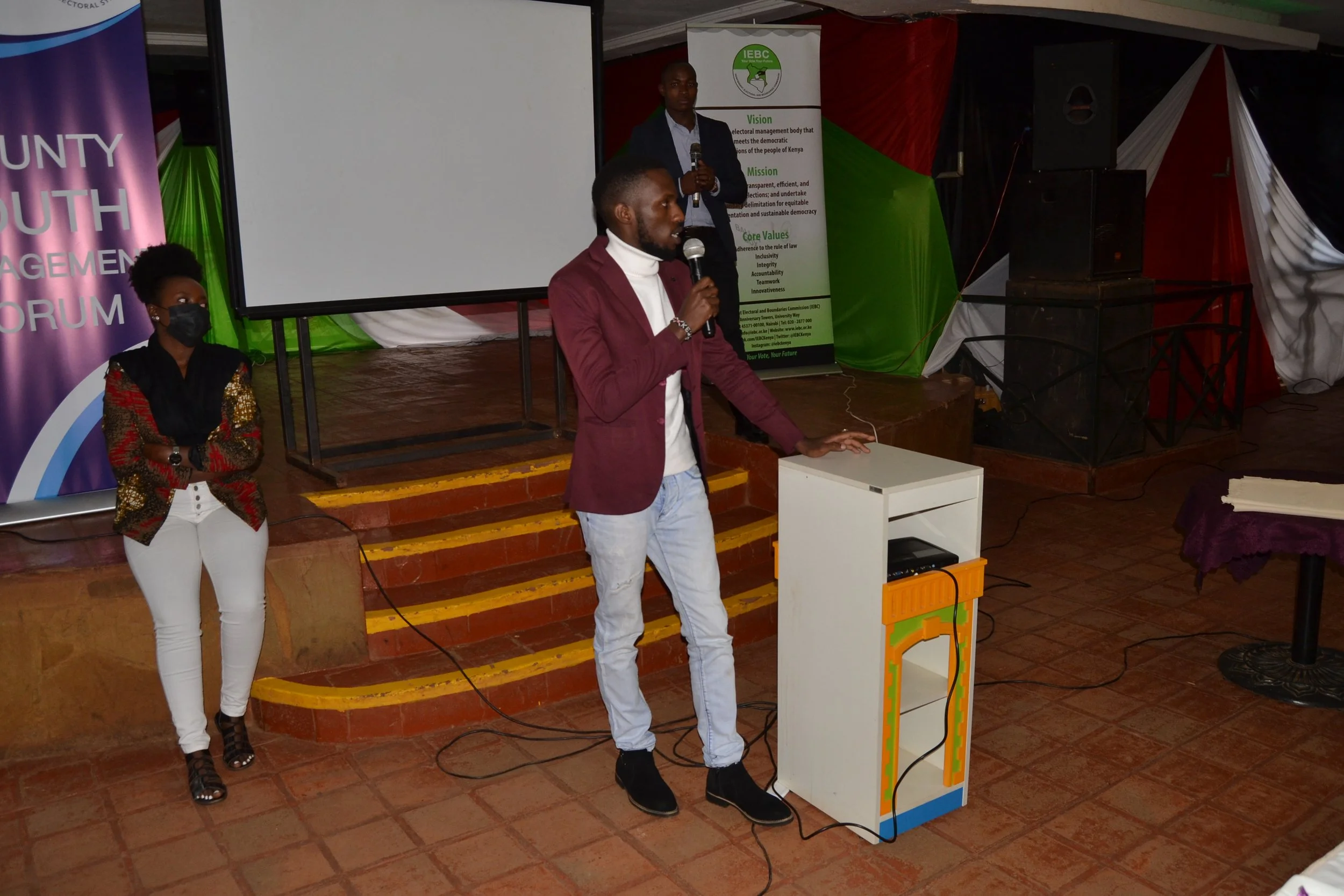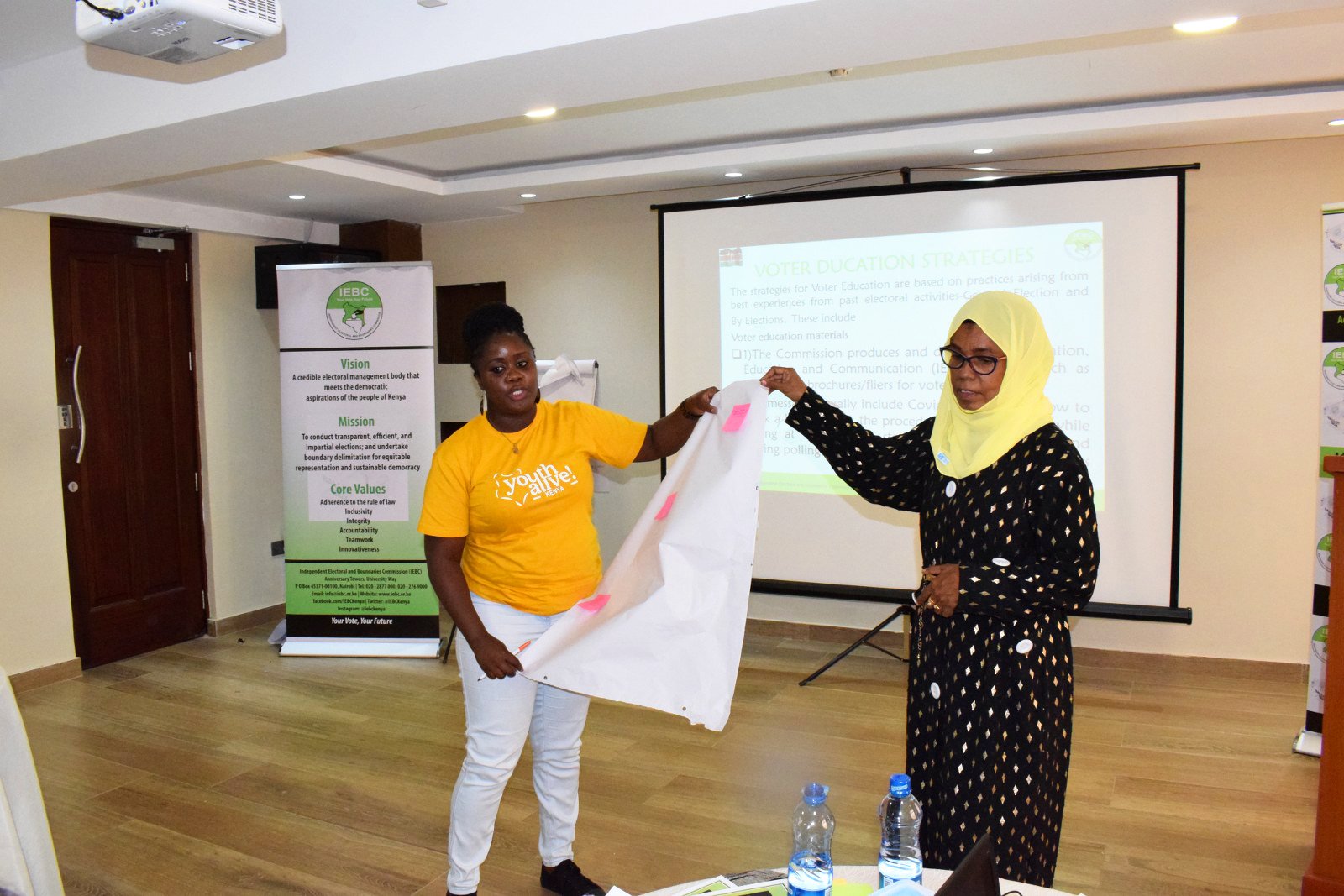Is Kenya Prepared For The 2022 General Elections?
It is now time to deliberate on the state of electoral preparedness ahead of 2022's general election in Kenya. Many stakeholders such as The Youth Café, Election Observation Group (ELOG), The Kenya National Commission on Human rights (KNCHR) as well civil societies, faith-based organizations, members of the public and duty bearers involved in the election process, have a vested interest in the upcoming elections.
We acknowledge that there are outstanding, crucial issues that must be addressed by all relevant election stakeholders in order to ensure the credibility of the polls. Young people need to know whether or not the elections are truly credible, peaceful, and fair. Some of the emerging issues include; people's lack of interest or concern toward the electoral process. Voter involvement is one of the key issues to be addressed. Participation in the general election remains a key challenge that could threaten the next general elections.
Further research by The Youth Café on voter registration numbers shows that the youth, who many thought would make up the majority of the 6 million intended voters registered, have not come out for the registration process. This trend is especially worrying given the fact that a vast majority of the laws legislated by the elected officials affect the youth.
Another concern is hectic political party processes, where despite political parties being the dominant vehicles for representation, they still face numerous challenges, especially party preliminaries. A recent report on political party nomination rules published in November of the year 2021 by The Youth Café shows that the majority of the political parties are struggling to comply with the directive on the nomination rules. The absence of strong party systems put minority groups such as persons with disabilities, youth, and women at risk of not getting represented in the upcoming elections.
In the case of diaspora voters, there has been a need to increase the number of diaspora voters in the electoral process. 30% of potential voters residing outside Kenya are unregistered. The probability of having locked out 4 million voters is high.
Legal Frameworks reforms remain a major issue ahead of the 2022 general elections. Critical legislations stated on the IEBC evaluation report 2017 that was uploaded on 12th February 2019 clearly state all procedures that should be implemented, are yet to be enacted and adopted. Inclusive of the many legislative proposals with a direct bearing on elections being fronted by various members of parliament in relation to challenges experienced in the 2017 election are yet to be amended. They include special interest groups amendment bill, two-thirds gender bill, and the regulatory framework around result transmission.
Early campaigns are also a key issue where there has been a significant rise in illegal political campaigns with different outfits being formed and divisive narratives being spread. Some of these narratives towards certain issues may or may not be true thus can be misleading and cause unrest to many voters. IEBC has so far not declared an electoral period hence those participating in campaigns as shown in the media are committing an electoral offense.
Political intolerance, hate speech, incitement, and misinformation are on the rise as political activities intensify. Cases of violence, especially among the youth around the country have been witnessed and new violence hotspots such as low income dwellings and major towns such as Nairobi, Kisumu, Eldoret and Nakuru. The Youth Café recently researched the causes of violence especially around the election period and showed that many perpetrators in these cases of violence are youth who are mostly used as pawns by political leaders for personal gains. Most youth who are involved, are unemployed or uneducated hence can easily be swayed into committing violent acts.
There has been a lack of proper leadership and integrity in elective positions. This is because candidates with unresolved ethical issues continue to show interest in vying for elections and candidates with cases of misconduct or legal issues have not been prosecuted nor charged, rather most still show intentions of vying for electoral positions.
There is also evidence of lack of electoral security where gender-based violence has been reported in recent political meetings especially harassment of women. Cases of mishandling of journalists have raised questions on the freedom of expression during the period. Also, election monitors have also expressed safety concerns including negative profiling and threats to their work.
To address some of the aforementioned issues, The Youth Café together with the stakeholders, have come up with several initiatives to ensure full implementation of the Election Operation Plan in a consultative process. Is IEBC prepared to address the information gaps by having a sensitive and robust communication department through constantly releasing information on public platforms for easy access? It is important that the new police officers to adopt their roles as election officers and regulate political gatherings and meetings in consistence with the pandemic guidelines whilst providing security in campaign venues to avert cases of violence against women.
The Youth Café as a leading youth organization in the political participation of youth, is implementing initiatives that focus mainly on educating the youth on all elections matters from voter registration to party primaries and electoral offenses to mention a few. Systematic and targeted voter education strategies for the youth and other special interest groups will go a long way in gaining apathy among the youth in terms of voter registration ahead of the mass registration processes.
IEBC should, however, consider adopting technological and administrative measures to ensure aspirants in the diaspora are cleared to run without having to travel. It should also avail easier options of determining one’s residence during voter registration and mobile registration centers should be made easily available.
To ensure that all political parties comply with the rules and regulations set out by the registrar of political parties and other relevant electoral laws, it is crucial for political parties to take steps that ensure inter and intra-party democracy and institutionalize them despite the resolution mechanisms in the code of conduct. Furthermore, political parties must use their membership lists while conducting their party primaries and the process must be transparent in the management of the party membership register as well as promote engagement and sensitization of special interest groups from the lowest level to promote a level playing field for the aspirants.
In order to check and control the use of the money during the forthcoming electoral process, a number of measures should be put in place such as vetting parties and candidates to promote transparency in the use of resources and campaigning on revoking the use of big money will level the playing field for aspirants especially the youths who are not adequately funded in the process. As well as demanding for the implementation of the election campaign financing act 2013 especially in sections that do not require further legislation.
The Youth Cafés appeal to the IEBC is to strictly enforce adherence to the legal timeline of guiding political campaigns. Young people also demand that the National Cohesion and Integration Commission intensify their monitoring of cases of hate speech and incitement to put an end to cases of violence. The Youth Café demands that leaders exercise political restraints and civic responsibility in their public appearances. IEBC should urge all members of the public and political leaders to adhere to the laid down pandemic management guidelines to contain the spread of COVID.
Elections are a celebration of fundamental human rights and we should all take practical steps to ensure that political rights are promoted, protected, and fulfilled as we look forward to the 2022 general election.
In conclusion, The Youth Café, as part of the IEBC Youth Coordinating Committee on elections, urges Kenyans to be more proactive as we head to the 2022 general election. This can be done by rejecting individuals who have been convicted or have pending corruption cases and those who have acted in contrast to the leadership and integrity as stated in the constitution. Together with its partners, The Youth Café is working to enhance youth participation in the electoral process through conducting voter education and mobilization of young people to register as voters ahead of the 2022 general elections.
The Youth Café works with young men and women around Africa as a trailblazer in advancing youth-led approaches toward achieving sustainable development, social equity, innovative solutions, community resilience and transformative change.
Contact us for any comments or suggestions.


